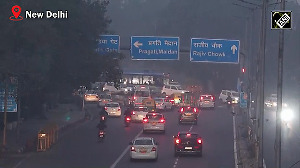With India gearing up to a new era of nuclear commerce, scientists at the Defence Research and Development Organisation and Indian Space Research Organisation say the Nuclear Suppliers Group waiver will not only address the country's energy needs but also help in getting critical technologies in diverse areas which have been denied for decades.
They believe apart from the nuclear energy, the waiver will result in flow of advanced technologies and a range of dual use items to India's way which would help various strategic programmes in many sectors including aerospace and defence.
Expecting the nuclear deal to go through at the US Congress, Chief Controller of Research and Development at DRDO, W Selvamurthy said the strategic partnership with the US will result in an environment that will encourage them to share with India critical technologies that were out of bounds for the last three decades.
"I think the strategic partnership with the US will result in an environment which will encourage them to share with us critical technologies whether they are in the civilian or military domain," the distinguished scientist told PTI.
He said "softening of attitude" towards India will lead to lifting of restrictions on advanced technology which will also help various programmes of the DRDO in many ways.
"When the denial regime is lifted in one sector it will have ripple effect in other sectors," Selvamurthy said.
ISRO's Director of Public Relations S Satish said the the Indo-US nuclear deal will result in a change of approach towards India by the US and other developed countries which will help in easing restrictions on dual use items and controlled technologies."The nuclear deal reflects recognition of India's scientific capability. Things will improve now. It should help our scientific programmes as key components for various strategic projects have been denied so far to India under the denial regimes," he said.
However, another DRDO scientist, observing that things would open up, said still there will be some kind of embargo on critical technologies and key defence components. "We can hope for a softening of approach in sharing critical technology. But still there will be some kind of embargo on critical technologies and defence components," the scientist, who wished not to be named, said.
Minister of State for Defence M M Pallam Raju said India was hopeful of getting access to dual use technology from America, if the nuclear deal goes through at the US Congress. "Access to dual use technology will definitely accelerate all the programmes in space, defence and other scientific areas. Even the private sector will benefit from it," he said. At present, there are restrictions on many dual use items and technologies which have applications in different sectors and if they are made available, the manufacturing industry is expected to get a huge boost.
Head of Business Development of Avionics, at Larsen and Toubro, Vinod Goley said the US will have to open up the core technology in certain areas as holding back the critical technology would backfire on them. "It will not be sustainable for the US to hold back technologies which have been denied to India so far," Goley said.
Vice President and Business Head of Godrej and Boyce Manufacturing Co Ltd S M Vaidya feels the NSG waiver will certainly raise India's stature at the international stage which will create a more encouraging environment for business Indian business community. "It is a landmark deal and I think post deal, the international business community will look at India in a different way. It will create a more conducive business environment for Indian companies," he said.
About 40 private sector companies have initiated talks with overseas counterparts to set up nuclear power plants in the country, envisaging a total investment of about Rs 2 lakh crore. India received a waiver from the 45-nation Nuclear Suppliers' Group on September 6 to take up nuclear trade without signing the Non-Proliferation Treaty.





